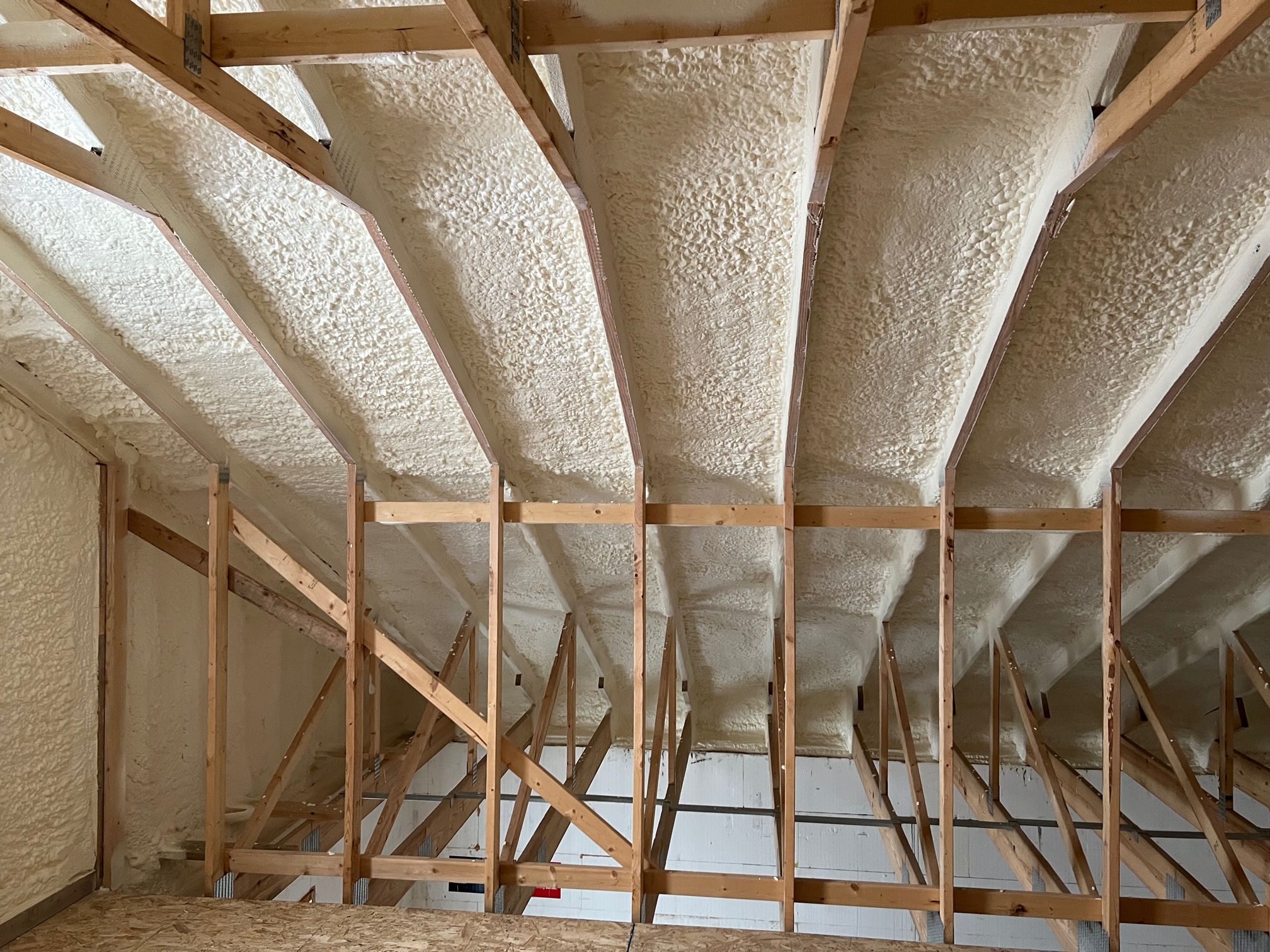Spray Foam: The Ultimate Solution for Air Sealing and Insulation
Spray foam insulation has arised as a leading solution for efficient air securing and thermal insulation, supplying a distinct mix of residential or commercial properties that establish it in addition to traditional techniques. Its capability to increase and load gaps makes it especially efficient in protecting against air leak, which can significantly impact energy effectiveness. Nonetheless, recognizing the full scope of its benefits, installation processes, and comparisons with other insulation types is important for making educated choices. As we discover these elements, the ramifications for both brand-new buildings and retrofits end up being progressively considerable. What aspects should influence your option?
What Is Spray Foam?
Spray foam is a flexible insulation material that combines the principles of air securing and thermal resistance to improve energy performance in structures. Composed primarily of polyurethane or various other similar compounds, spray foam is used as a liquid that increases upon call with surfaces, developing a solid, continuous layer of insulation. This one-of-a-kind property permits it to fill up voids, fractures, and voids that typical insulation materials might ignore, providing a premium air seal.
There are two major kinds of spray foam: open-cell and closed-cell. Open-cell spray foam is lighter and more versatile, offering superb noise absorption and a reduced R-value per inch - Spray Foam. On the other hand, closed-cell spray foam is denser, providing a higher R-value, dampness resistance, and added architectural integrity to constructing components
The application procedure generally entails specialized devices, ensuring a seamless application that complies with various substrates, consisting of metal, timber, and concrete. This flexibility makes spray foam suitable for both new building and constructions and retrofitting existing frameworks. Its ability to produce an impermeable obstacle considerably adds to reducing energy usage and boosting interior air quality, thus making it a recommended selection among home builders and homeowners alike.
Advantages of Spray Foam Insulation
Among one of the most significant advantages of spray foam insulation is its outstanding capacity to develop a continuous air barrier, which effectively reduces energy loss. Unlike conventional insulation materials, spray foam broadens to fill up fractures and voids, making certain that air leak is drastically reduced. This characteristic not only enhances power performance yet additionally brings about decrease energy expenses in time.
Additionally, spray foam insulation offers superior thermal resistance, contributing to a more secure interior atmosphere. Its high R-value per inch enables for effective insulation in confined rooms, making it ideal for attic rooms, wall surfaces, and crawl areas. The moisture-resistant residential or commercial properties of spray foam help protect against mold and mildew and mildew development, advertising healthier living problems.
One more crucial advantage of spray foam insulation is its sound-dampening high qualities (Spray Foam). It effectively lowers sound transmission between areas, producing a quieter and more comfy home atmosphere. The resilience of spray foam additionally sticks out, as it does not sag or clear up in time, keeping its performance throughout its life-span
How Spray Foam Functions
Understanding just how spray foam insulation works is crucial for appreciating its performance in air sealing and thermal resistance. Spray foam insulation includes two main parts: isocyanate and polyol resin. When these parts are mixed, they go through a chemical response that triggers the product to expand quickly, developing a thick foam that fills cavities, spaces, and splits.
As the foam increases, it sticks to surfaces, developing an impermeable seal that significantly decreases air infiltration. This particular makes spray foam insulation very effective at avoiding drafts and wetness infiltration, which can bring about power loss and damages over time. Additionally, the closed-cell variation of spray foam uses remarkable thermal resistance due to its rigid structure, efficiently reducing warm transfer.
The one-of-a-kind residential or commercial properties of spray foam enable it to comply with uneven surface areas, making sure detailed protection and a smooth obstacle. As an outcome, spray foam insulation not only improves energy efficiency but also adds to improved interior air top quality by lowering the buildup of irritants and toxins. Eventually, comprehending the auto mechanics behind spray foam underscores its role as a superior choice for insulation and air securing in both household and industrial applications.
Installation Refine Summary

Before setup, the room should be appropriately cleaned and prepped, making sure that surfaces are totally free from dust, dampness, and particles. This action is crucial because pollutants can endanger attachment and overall performance. When the area is prepared, the application includes blending both parts of the spray foam, which increases upon contact and fills gaps efficiently.
Trained experts ought to carry out the setup, using specific devices to make certain consistent insurance coverage and optimum thickness. Safety and security preventative measures, consisting of using protective gear and guaranteeing proper ventilation, are vital during this process. After application, the foam generally cures quickly, forming a strong obstacle that improves energy efficiency.
Contrasting Spray Foam to Typical Insulation
When reviewing insulation choices, spray foam insulation stands out in comparison to standard materials such as fiberglass and cellulose. click now Unlike fiberglass and cellulose, which can permit air infiltration, spray foam increases upon application, filling up gaps and gaps to create an impermeable seal.
In addition, spray foam offers a greater R-value per inch than standard insulation types, using more efficient thermal resistance in a thinner account. This characteristic is specifically useful in spaces with restricted dental caries depth. Spray foam is immune to moisture and mold development, which can be a substantial issue with cellulose and fiberglass, specifically in humid atmospheres.
Nevertheless, spray foam insulation typically brings a greater ahead of time cost than its conventional equivalents. Homeowners must weigh this preliminary financial investment versus long-term energy cost savings and efficiency advantages. Inevitably, while both insulation types serve their function, spray foam becomes an advanced solution for modern insulation needs, especially in terms of air sealing and thermal effectiveness.

Verdict
In recap, spray foam insulation stands for a very reliable remedy for attaining ideal air try this site sealing and thermal resistance. Its special residential properties, consisting of wetness resistance and noise dampening, make it suitable for various applications in both brand-new building and constructions and retrofitting tasks (Spray Foam). Although the first expenses may be higher contrasted to typical insulation products, the long-lasting benefits, such as significant power cost savings and enhanced indoor air top quality, warrant the investment and underscore its worth in contemporary building techniques.
Spray foam insulation has actually emerged as a leading remedy for efficient air securing and thermal insulation, using a distinct mix of homes that set it apart from standard methods.Spray foam is a functional insulation material that integrates the principles of air securing and thermal resistance to boost energy performance in buildings.When reviewing insulation choices, spray foam insulation stands out in contrast to conventional products such as fiberglass and cellulose. Ultimately, while both insulation types offer their purpose, spray foam arises as an extra sophisticated remedy for modern insulation requirements, specifically in terms of air sealing and thermal effectiveness.
In recap, spray foam insulation represents an extremely reliable service for attaining optimum air sealing and thermal resistance.